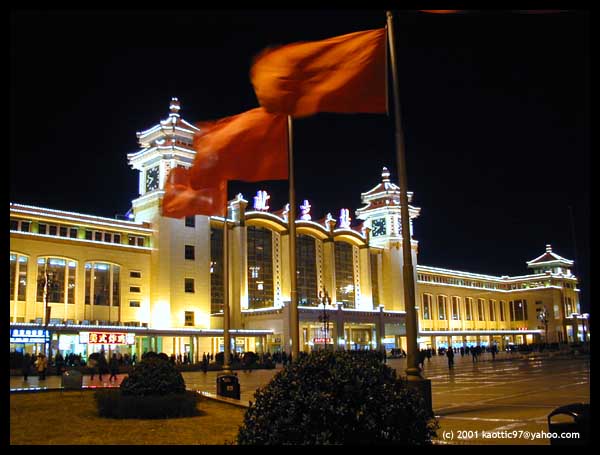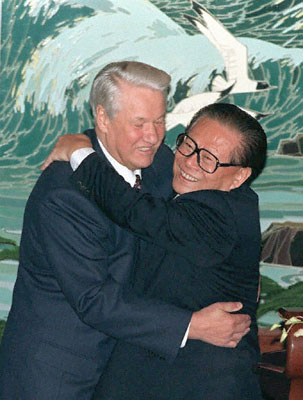SELF-DECEPTION AND THE TRAIN FROM CHINA
January 21, 2008
International News Analysis Today
By Toby Westerman
China to Germany by train - it will save 20 days shipping time and is scheduled to begin in 2009. The train route is based upon cooperation between Russia and China. The close relationship between China and Russia is reviving a land route between Asia and Europe which has been little used since the fifteenth century.

The railway also puts to rest one of the greatest instances of self-deception in the past 15 years - the purported hostility between Russia and China.
Since the fall of the Soviet Union, many of the U.S. political elite assumed that Russia, vulnerable and weak, would prove an irresistable target for increasingly powerful China. Moscow would be forced to ally with the United States to guard its eastern regions against China's growing population pressure and military prowess.
It was a great reassurance to many in the Washington elite that Moscow and Beijing would not join against the United States. This theory was, however, nothing more than an exercise in self-deception.
The China to Europe rail link disproves the theory of innate hostility between Moscow and Beijing, but the rail link is only one in a series of events which should have alerted U.S. policy makers and politicians to what was in fact a Russian-Chinese alliance.
Close cooperation between Moscow and Beijing is a threat to the U.S., because both Russia and China see the United States as their main global rival, and both nations - despite the collapse of the Soviet Union and the establishment of "democratic" Russia -- are hostile to the U.S. democratic tradition.
The alliance between Moscow and Beijing is a very dangerous development for the United States, but neither the U.S. media, nor the political elite, seem ready to confront this reality.
The China to Europe rail link is not the first indication of the working relationship between China and Russia. The China-Russia military exercises made brief headlines in 2005, but concern about the relationship between Moscow and Beijing seemed to pale before the threat of terror and the on-going war in Iraq.
Moscow has taken pride in its ties with China, including military assistance. Not long after the collapse of the USSR, Radio Moscow (which later changed its name to the Voice of Russia) boasted in August 1994 that Russia "will remain a major source of Chinese weapons," including missiles, tanks air-borne radar, and educating Chinese officers in Russian military academies.
 By 1997, Boris Yeltsin of Russia and Chinese president Jiang Zemin concluded agreements on cooperation toward a New World Order which was directed against the United States.
By 1997, Boris Yeltsin of Russia and Chinese president Jiang Zemin concluded agreements on cooperation toward a New World Order which was directed against the United States.
Russia, China, and several of the post-Soviet Central Asian republics have joined together in the Shanghai Cooperation Organization, which draws most of the Eurasian land mass together under a single political entity.
Moscow and Beijing have even agreed on joint space exploration projects.
Although fundamentalist Islam has proven that it is a bloodthirsty opponent, capable of killing thousands, perhaps millions, of innocent lives, Muslim militants are not able to capture and hold any large tract of non-Islamic territory.
The jihadists can inflict pain and terror, especially on fellow Muslims, but they cannot defeat the armed forces of a modern nation when the people of that nation support the struggle against terror. Islamic militants are almost completely dependent upon the moral weakness of their enemies in the West.
This is not true of the Moscow-Beijing alliance.
Taken together, Moscow and Beijing control a vast expanse of land, large populations, and one of the world's largest deposits of oil, natural gas, diamonds, and precious metals. These resources are at the service of the Chinese and Russian military forces, which are becoming increasingly sophisticated and lack only technical sophistication to challenge the United States.
The potential exists that if the U.S. is not careful and does not take precautions, Moscow and Beijijng will set the terms for a New World Order. The United States could become a de facto client state of Russia and China, and lose its freedom, security, and economic strength in the process.
Copyright 2008
International News Analysis
Return to INA TODAY.com homepage